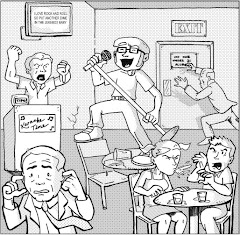Muties #3, June 2002, Marvel Comics
writer: Karl Bollers
artist: Dean Haspiel
colorist: Matt Madden
letterer: Paul Tutrone
assistant editor: Pete Franco
editor: Mark Powers
Blogger's note: Entry for Tuesday, February 5, 2008.
Shopping for comics to review for Black History Month is sometimes challenging, because in many cases I am literally judging a book by its cover. My intent with such a series is twofold: I'd like to spotlight prominent black characters in the medium, like Steel or Mr. T, and also explore relevant cultural issues -- because I know plenty of comics that venture beyond the realm of the fantastic to explore the more subversive, often controversial aspects of reality. When I saw the cover of Muties #3, featuring a map of Uganda, I figured I'd be in for the latter, but actually writer Karl Bollers uses both to his advantage. In essence, Muties #3 is the perfect example of how to combine the splendor of superheroes with the tragedy of truth.
Riek is a thirteen-year-old Ugandan whose class is abducted and forcefully recruited into a radical rebel army, which, according to the subtexts of Riek's inner monologue, is a fairly frequent practice. When Riek fails to comply with an officer's orders, they chop off his ear to teach him a lesson, and Riek dutifully falls in line. At the same time, in moments of extreme duress, Riek experiences periods when time seems to slow down; however, in the midst of a fire fight, when a hail of bullets hovers before him, Riek realizes that time isn't moving slowly as much as he's really moving fast, a power he uses to his army's advantage. Riek claims that his going fast is a result of a his heart's slowing down, and in the end, when he finally decides to overcome his masters, the world freezes -- and in an unexpected twist, our young, tragic hero dies.
Boller's script is surprisingly succinct and poignant, reading like the thoughts of a confused child yet carrying the implications of the weight of the world. Dean Haspiel, whose most recent work includes Image's Brawl, captures the spirit of the story perfectly, with an unconventional style that occasionally betrays a Kirby influence but looks more like a Timm or Cooke storyboard (all in a good way) and that completely compliments the youth brewing beneath these dire circumstances. Primarily told through Riek's inner monologue text captions, Haspiel maintains a linear sense of story and also a visual momentum that elevates this book's look to a prestige format class.
I expected Muties to represent the many watered down X-Men spin-offs that have clogged the stands over the past fifteen years, but I was pleasantly surprised to discover some real substance under this gamble of a cover. At the same time, I took no pleasure at all in reading about a potentially perpetual abuse of children in Uganda. For the first time in a long time, a comic book has inspired me to investigate and determine if its subtexts are true. If such a crime is happening now, the world surely couldn't move slowly enough for us to stop it fast enough. Further, regarding its context within Black History Month . . .? A few nights ago, Dr. Phil addressed the seeming "black youth" issue of saggy pants. Reverend Al Sharpton guested and everything. In contrast, perhaps everyone needs to develop the mutant power of X-ray vision -- to see through our petty social concerns toward the issues that really matter.
Wednesday, February 06, 2008
Muties #3
Labels:
Dean Haspiel,
Karl Bollers,
Mark Powers,
Marvel Comics,
Matt Madden,
Muties,
Paul Tutrone,
Pete Franco
Subscribe to:
Post Comments (Atom)



No comments:
Post a Comment